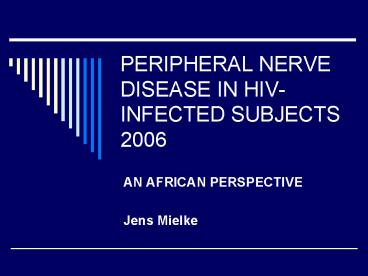PERIPHERAL NERVE DISEASE IN HIV INFECTED SUBJECTS 2006 - PowerPoint PPT Presentation
1 / 22
Title:
PERIPHERAL NERVE DISEASE IN HIV INFECTED SUBJECTS 2006
Description:
... NRTI increases the difficulty of distinguishing TNA from DSP. ... Incidence rates of TNA/100 person years in 1116 patients, receiving one of five ... – PowerPoint PPT presentation
Number of Views:86
Avg rating:3.0/5.0
Title: PERIPHERAL NERVE DISEASE IN HIV INFECTED SUBJECTS 2006
1
PERIPHERAL NERVE DISEASE IN HIV- INFECTED
SUBJECTS2006
- AN AFRICAN PERSPECTIVE
- Jens Mielke
2
Overview - 2004
- Epidemiology
- Classification
- Pathology and neurophysiology
- Clinical characteristics
- Investigations
- (Management)
- (Prognosis)
3
INTRODUCTION - 2006
- New research findings
- New perspectives
- Ongoing questions
4
Classification
- Distal Symmetrical polyneuropathy (DSP)
- Idiopathic
- Associated with neurotoxic drugs
- Associated with vitamin B12 deficiency
- Inflammatory demyelinating polyneuropathy
- Mononeuropathy (multiplex)
- Progressive polyradiculopathy
- Autonomic neuropathy
5
Distal symmetric polyneuropathy
Not on ARVs
6
Clinical and subclinical neuropathy in patients
with human immunodeficiency virus receiving
antiretroviral therapy Villelabeitia-Jaureguizar
K
- Spanish
- Incidence of symptomatic and subclinical PN in
108 patients on ddI, lamivudine and efavirenz 2
years - 1.85 symptomatic, (but prevalence 66
subclinical on EMG study)
7
HIV neuropathy natural history cohort study
assessment measures and risk factors Simpson DM
ACTG A 5117
- 101 subjects, 49 d-drug ARVs, mean CD4 169
- 62 PN, 35 (10/28) developed during study
- ARV use not associated with worsening of TNS
- No correlation PN and lactate or mtDNA content
- study nurses misclassified ankle and distal
vibratory sensation compared with neurologists.
Nonphysician correct ankle reflexes 53/101 (52)
8
Antiretroviral use and other risks for
HIV-associated neuropathies in aninternational
cohort C.L. Cherry
- 63 PN
- Symptomatic strongly associated with ddI or d4T
- Vibratory threshold best discriminator for sPN
- Neuropathy prevalence similar Baltimore and
Melbourne
9
Skin biopsy a predictor of transition to
symptomatic HIV neuropathy?A longitudinal study
D.N. Herrmann
- Measures of small sensory fibres (leg epidermal
nerve fibre density, cooling and heat pain
thresholds) seem to be associated with transition
to symptomatic HIV-associated distal sensory
neuropathy 6 to 12 months later
10
Toxic neuropathy from ARVs
- NRTIs zalcitabine (ddC), stavudine (d4T) and
didanosine (ddI). - onset 1 week to 6 months, typically more acute
than the onset of DSP, and pain may be more
prominent - Symptomatic improvement weeks to months in about
two-thirds of patients after discontinuation,
often preceded by initial period worsening
symptoms.
11
Toxic neuropathy from ARVs
- Often these two conditions are
indistinguishable. The failure of at least
one-third of cases of TNA to improve upon
cessation of the precipitating NRTI increases the
difficulty of distinguishing TNA from DSP. - Estimated 15-30
- Mechanism inhibition of mtDNA polymerase
12
Incidence rates of TNA/100 person years in 1116
patients, receiving one of five antiretroviral
regimens and followed by the Johns Hopkins AIDS
Service.
13
Toxic neuropathy from ARVs
- serum lactate levels have been found to help
distinguish between nucleoside induced neuropathy
and HIV neuropathy with a specificity and
sensitivity of 90. - mitochondrial DNA in peripheral blood mononuclear
cells quantification single-tube duplex
real-time DNA-nucleic acid sequence-based
amplification assay.
14
Toxic neuropathy from ARVs
- A small open label study using l-acetyl carnitine
demonstrated improvement in the symptoms of
neuropathy induced by NRTIs, providing support
for mitochondrial toxicity as a mechanism for
NRTI induced neuropathy
15
Protease InhibitorMediated Neurotoxicity
Jacqueline A. Pettersen,
- 101/ 221 PN (37 ARV PN) 1998-2004
- HIV-infected DRG cultures exposed to indinavir or
didanosine showed significant neuronal atrophy,
neurite retraction, and process loss, compared
with controls. Indinavir was selectively
cytotoxic to DRG macrophages compared with other
ARVs
16
HIV associated neuromuscular weakness syndrome
- Motor weakness days to weeks, hyperlactaemia,
nausea / vomiting, hepatomegaly - Variable presentation progressive sensorimotor
polyneuropathy to myopathy - 13 mortality
17
Diffuse infiltrative lymphocytosis syndrome
- Persistent CD8 lymphocytosis
- Visceral infiltration salivary glands, lungs,
kidneys, GIT, nerves. - Acute or subacute painful multifocal symmetrical
neuropathy (axonal) - Angiocentric CD8 infiltrates and p24 expression
- Treatment ARVs /- steroids
18
Inflammatory Demyelinating Polyneuropathy
- Guillain Barre syndrome (AIDP) and chronic
inflammatory demyelinating polyneuropathy (CIDP) - GBS acutely (up to four weeks) progressive
generalised weakness with areflexia and mild
sensory impairment - CIDP longer course, monophasic or relapsing
- Often seen in asymptomatic HIV
19
Inflammatory Demyelinating Polyneuropathy
- No controlled treatment trials
- Response similar to HIV- (but anecdotally related
to degree of immune suppression) - CIDP oral corticosteroids. AIDP and relapses
CIDP role of IV immunoglobulins / plasma
exchange.
20
Multiple Mononeuropathy
- Rare Multifocal sensory complaints in the
distribution of cutaneous nerves, mixed nerves
and roots. - Asymmetrical distribution, preserved reflexes
- Two syndromes limited in those with CD4 200,
extensive in others with concomitant CMV
infection - Nerve biopsy may be necessary (immune suppression
vs specific Rx e.g. ganciclovir)
21
Progressive Polyradiculopathy
- Frequent CMV association (also VZV infection,
neurosyphilis and leptomeningeal lymphoma ) - Rapid progression
- Lower extremity and sacral parasthesiae
- Paraparesis, areflexia, ascending sensory loss
(occasional thoracic level) and urinary retention - Cauda equina pain
- Onset to deaths - six weeks
- CSF WBC ? (polymorphs), protein ?, glucose ?
22
(No Transcript)































